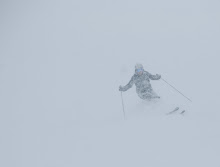I taught a beginner class of skiers yesterday. As I started to move away from the Snow School sign with the group, an adult pulled me aside. "Two of the children are special needs, and lack balance. My husband will stay with the group and help them". I asked "Are you their mother?" She replied, "No, their aide". Walking with skis on for the first time is a challenge for most children. The skis are like big long sticks attached to their feet, and their feet are encased in plastic shells. Many comment that it feels like they are walking on the moon. One of the special children looked up at me as she walked away from the sign with skis on for the first time. "I'm going to have fun today", she confided. I answered, "Yes, you will".
She did have fun and I did too. There was enthusiasm and encouragement for the whole class. On a mere hiccup of a hill, the children practiced sliding their feet into a wedge in order to stop. They listened to instruction and came down in an orderly fashion (or at least as orderly as a beginner class can - there were the expected veers toward the right and the sit down slides to avoid hitting friends). After a bit of practice, we headed to the rope tow on the bunny hill. I provided the usual explanation. "Stand with your skis pointing uphill, put one hand over the rope; then other, letting the rope go through your hands. Hear the buzzing of the rope in your hands and then gently squeeze the rope like you are squeezing toothpaste and let it pull you up the hill".
The temptation to grab the rope and use it for balance while skis are still sideways to the hill is strong. Yet, yesterday, the children resisted the temptation. Some fell during their first try but because they were startled that they riding the tow, not because they were yanked suddenly. I stood behind the boy with special needs. His aide told me that he doesn't have much core strength. I asked if it was okay if I poked his back (which I have learned causes kids to pull in with their abs and stand with strength.) I was told it was okay. I stood directly behind him, with my longer skis parallel to his. If necessary, I would hold on to him as we went up the rope. It wasn't necessary the whole way. I got him started and then gradually slid away from him until he was riding the tow on his own. The aide, her husband, and a parent started to cheer. The boy smiled and said "this is fun". I felt good and felt peace and connectedness. The rest of the class progressed well with all the children learning to slide to a stop and to ride the tow with confidence.
Today I taught another class of beginners. Some elementary schools choose not to identify students with special needs. This is the school's prerogative and I respect it. As soon as we started to move away from the Snow School, I realized that today's class also had several children with special needs. One parent followed us to the bunny hill and observed from a distance. Without the help of aides or parent volunteers, the children waited while I gave the individual attention that was necessary to keep them safe. Some of the children lacked gross motor skills and were not able to line their foot up with the ski to put them on. Progress was slow and, to be honest, my patience waned. I love teaching skiing to children, especially to children who do not often get to be outside and who do not feel the joy and freedom of sliding and the wind in their face. And to be honest, I don't think the children felt the joy and freedom of sliding today. An aide or volunteer or the smaller class size that we would have assigned to me had we known in advance, would have made a difference in the quality of the lesson and enjoyment of the lesson.
Labels can be damaging but they can also be inhibiting. I believe with every fibre of my heart in treating every person I meet with respect and that every person I meet has a role to play in my life. I really felt it was a privilege to witness the children's excitement yesterday when they skied independently. I felt sad today that I was unable to give the same experience to children capable of even more. If differences were accepted, then labels wouldn't matter. Children with autism, children with brain injuries, children with spina bifada, children with two parents, children with no parents, children of the world. Children are children.
Wednesday, March 19, 2008
Subscribe to:
Post Comments (Atom)

No comments:
Post a Comment